|
|
|
Sort Order |
|
|
|
Items / Page
|
|
|
|
|
|
|
| Srl | Item |
| 1 |
ID:
095831
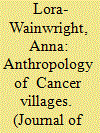

|
|
|
|
|
| Publication |
2010.
|
| Summary/Abstract |
This paper examines how villagers in rural Sichuan understand the development of cancer, how they attempt to make sense of why it seems widespread and of why it affects particular individuals. Lay aetiologies of cancer such as negative emotions, smoking, consuming alcohol and preserved vegetables are addressed in order to contextualise environmentally related factors, and explain why they may or not be resorted to. With reference to ethnographic examples, I argue that awareness of pollution's effects on health can only gain strength when it is consonant with locals' experience and moral parameters and when it is perceived to be productive in attracting media attention and obtaining redress from various levels of state bureaucracy.
|
|
|
|
|
|
|
|
|
|
|
|
|
|
|
|
| 2 |
ID:
095832
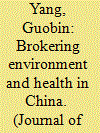

|
|
|
|
|
| Publication |
2010.
|
| Summary/Abstract |
This article identifies four types of issue entrepreneurs in the creation of public issues about the environment and health in China. They are media professionals, environmental and health NGOs, villagers, and netizens. Because of the different resources of issue entrepreneurs and the constraints of China's political context, politically safe and innocuous issues and issues of concern to the urban population are more likely to enter the public sphere. Contentious issues linked to the interests of powerful business and political actors may become publicized under extraordinary circumstances such as emergencies, disasters, or epidemics, suggesting that external shocks may have a galvanizing effect. Some environment-related health issues, such as pollution-related cancer, are high-stake issues. They often affect the most disadvantaged segments of the Chinese population, yet despite their gravity, their chances of entering the public sphere are small.
|
|
|
|
|
|
|
|
|
|
|
|
|
|
|
|
| 3 |
ID:
095823
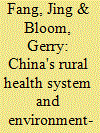

|
|
|
|
|
| Publication |
2010.
|
| Summary/Abstract |
This paper presents a chronology of the development of the Chinese rural health system and its responses to environment-related health problems. During the early years of the People's Republic, the health system was very successful in reducing the transmission of infectious diseases through environmental improvements. Since the transition to a market economy, environment-related preventive programmes have been given less priority and a variety of new environment-related health problems and risks have emerged. More recently, the Chinese government has made strong commitments to improve the performance of the health system and increase access by all. Its focus has been on strengthening medical care and developing new forms of health finance. It has paid little attention to environment-related problems. However, as the pace of health reform accelerates, it will be important to ensure that it take environment-related problems into account.
|
|
|
|
|
|
|
|
|
|
|
|
|
|
|
|
| 4 |
ID:
095821


|
|
|
|
|
| Publication |
2010.
|
| Summary/Abstract |
This paper is an introduction to the special issue. It provides an overview of the major environment-related health risks China faces, and a review of some of the responses currently being made by the government and societal actors. The paper concludes with a discussion of the contributions that the social sciences might make to our understanding of these issues.
|
|
|
|
|
|
|
|
|
|
|
|
|
|
|
|
| 5 |
ID:
095835


|
|
|
|
|
| Publication |
2010.
|
| Summary/Abstract |
In the process of the globalization in culture, English has become more and more powerful and hegemonic along with the obscurity of the boundary of nation-states. The blurring of the national identity has led to the variegation of language. Although people of almost all countries are learning the English language, the hegemonic position of the traditional 'King's English' or 'Queen's English' has gradually been deconstructed, with many global 'englishes' appearing in the contemporary English-speaking world and non-English-speaking world. This fact has also had a strong impact on the purity of Chinese, one of the newly emergent international languages. Along with the heightening of China's position as both an economic and political power in the world, the fever for learning Chinese will also rise in some non-Chinese-speaking countries. Like English, Chinese is also undergoing a sort of splitting: from one standard Chinese into different 'Chineses'. Thus writing literary history could also be done by means of language rather than merely by that of country or nation. The essay concludes with the author's new model for rethinking literary historiography by calling for the rewriting of a new literary history in Chinese.
|
|
|
|
|
|
|
|
|
|
|
|
|
|
|
|
| 6 |
ID:
095833
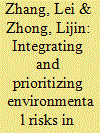

|
|
|
|
|
| Publication |
2010.
|
| Summary/Abstract |
Human society faces a growing number of risks, including both natural disasters and risks that stem from human behavior. This is particularly true in China, which is experiencing rapid social, economic and political transitions. Since the 1970s, China's modernization process has been accompanied by the emergence of an increasing number of man-made risks, in particular environmental pollution, but until very recently, a risk management system did not exist in China. Society was woken up by a series of disasters and accidents, including SARS in 2003, followed by the explosion of avian flu and the chemical spill in the Songhua River in 2005. The last incident in particular finally kicked off the development of a national risk management system (specifically an emergency response system) in China. This paper analyses the status quo of the legislation, institutions and mechanisms for risk management in China and identifies opportunities and strategies for prioritizing and integrating environmental and health risks into the emerging system. The study concludes that although a series of alarming incidents have succeeded in putting risk management issues at the top of the public and political agenda, currently risk management in China can be characterized as reactive and compartmentalized, with a lack of prioritization and integration of policy efforts and resources. There is also a danger that the traditional state-centered approach may fail to create an effective risk management system, which requires improved transparency, accountability, and cross-sectoral coordination. The paper concludes with the proposal of strategies that might enable the environmental authorities to be more effective and reduce their marginalization and isolation.
|
|
|
|
|
|
|
|
|
|
|
|
|
|
|
|
| 7 |
ID:
095834


|
|
|
|
|
| Publication |
2010.
|
| Summary/Abstract |
This article considers why China has continued to support multilateral efforts to develop the Tumen River Delta region despite the failure of these efforts to achieve significant economic results. It argues that China has sustained its critical role in Tumen development because the project has served multiple objectives consistent with China's approach to managing its security along its land borders, and in this case its border with the Korean peninsula-an approach which sees its domestic and international security objectives as not only linked but closely intertwined.
|
|
|
|
|
|
|
|
|
|
|
|
|
|
|
|
| 8 |
ID:
095827
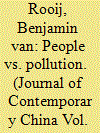

|
|
|
|
|
| Publication |
2010.
|
| Summary/Abstract |
Chinese pollution victims have increasingly started to resort to political and legal action to protect their interests. This paper analyzes such activism by studying how citizens identify the necessity to initiate action against pollution and by investigating the obstacles they meet when attempting to take action. The paper highlights the importance of state and intermediary institutions to aid citizens in understanding the seriousness of pollution and overcoming the obstacles they face. It shows, however, that often such aid is not available, and that state institutions when aligned with industrial interests restrict rather than support citizen action. When this occurs, citizen activism becomes an isolated affair, resulting in adversarial relations with state and industry, sometimes escalating to violence and repression of activists. The paper concludes that isolated activism forces a new look at concepts such as 'embeddedness' and 'rightful resistance' to capture citizen activism and contentious politics in China.
|
|
|
|
|
|
|
|
|
|
|
|
|
|
|
|
| 9 |
ID:
095825


|
|
|
|
|
| Publication |
2010.
|
| Summary/Abstract |
The surge in automobile use in the Pearl River Delta region has led to a substantial elevation of ambient concentrations of vehicle-based air pollutants. These pollutants have created a region-wide air pollution problem marked by a steady increase in the number of smoggy days in the Delta, presenting a serious threat to public health. Evidence gathered from Guangzhou suggests that the city's strategy for controlling urban air pollution has not been effective in tackling the newly emerging, combustion engine-generated class of pollutants because it is misguided by a highly selective and outdated urban air quality monitoring system. The disarticulation between vehicular emissions and urban emission control measures shows that a central government-prescribed methodology for air quality monitoring can strongly influence the policy priorities and administrative behavior of local government institutions.
|
|
|
|
|
|
|
|
|
|
|
|
|
|
|
|
| 10 |
ID:
095836


|
|
|
|
|
| Publication |
2010.
|
| Summary/Abstract |
This paper examines the subjective evaluation of the changes and continuity in status of civil liberties and political rights by ordinary people in China. Our analysis, based on survey data, reveals that an absolute majority of people believe that both civil liberty and political freedom in China have improved significantly since 1979. To verify the validity of the survey findings, we analyze the contents of People's Daily, the official newspaper of the Chinese Communist Party in 1976, 1978, 1988 and 2002. We found that People's Daily, the most conservative newspaper in China, published an increasing number of critical articles about the government. Its criticism not only challenged individual officials but also the fundamental development strategy adopted by the CCP. In content analysis, we also trace how four key terms-democracy, freedom, human rights, and religion-were employed in People's Daily. The analysis shows that the official rhetoric appearing in People's Daily exhibited a steady positive trend in describing these terms. We conclude our discussion by analyzing those who are more likely to perceive civil liberties and political rights as improved over time in China. The analysis reveals that those with a better education and a higher income are more likely to perceive positive changes in Chinese society.
|
|
|
|
|
|
|
|
|
|
|
|
|
|
|
|
|
|
|
|
|